On the morning of September 8th, the Vietnam Chamber of Commerce and Industry (VCCI) and the Vietnam Digital Communications Association (VDCA) with the coordination of the Institute for Policy Studies and Media Development (IPS), organized the conference “Comments on the Draft Decree to Replace Decree 72/2013/ND-CP on the Management, Provision, and Use of Internet Services and Information on the Internet.”
The seminar was attended by Ms. Nguyen Thi Thanh Huyen, Deputy Director of the Authority of Broadcasting and Electronic Information, Ministry of Information and Communications (MIC), Mr. Dau Anh Tuan, Deputy Secretary-General cum Head of the Legal Affairs Committee of VCCI, Mr. Vu Kiem Van, Deputy Chairman cum Secretary-General of VDCA, as well as representatives from various associations, businesses, legal offices, consulting firms, researchers, and media agencies.
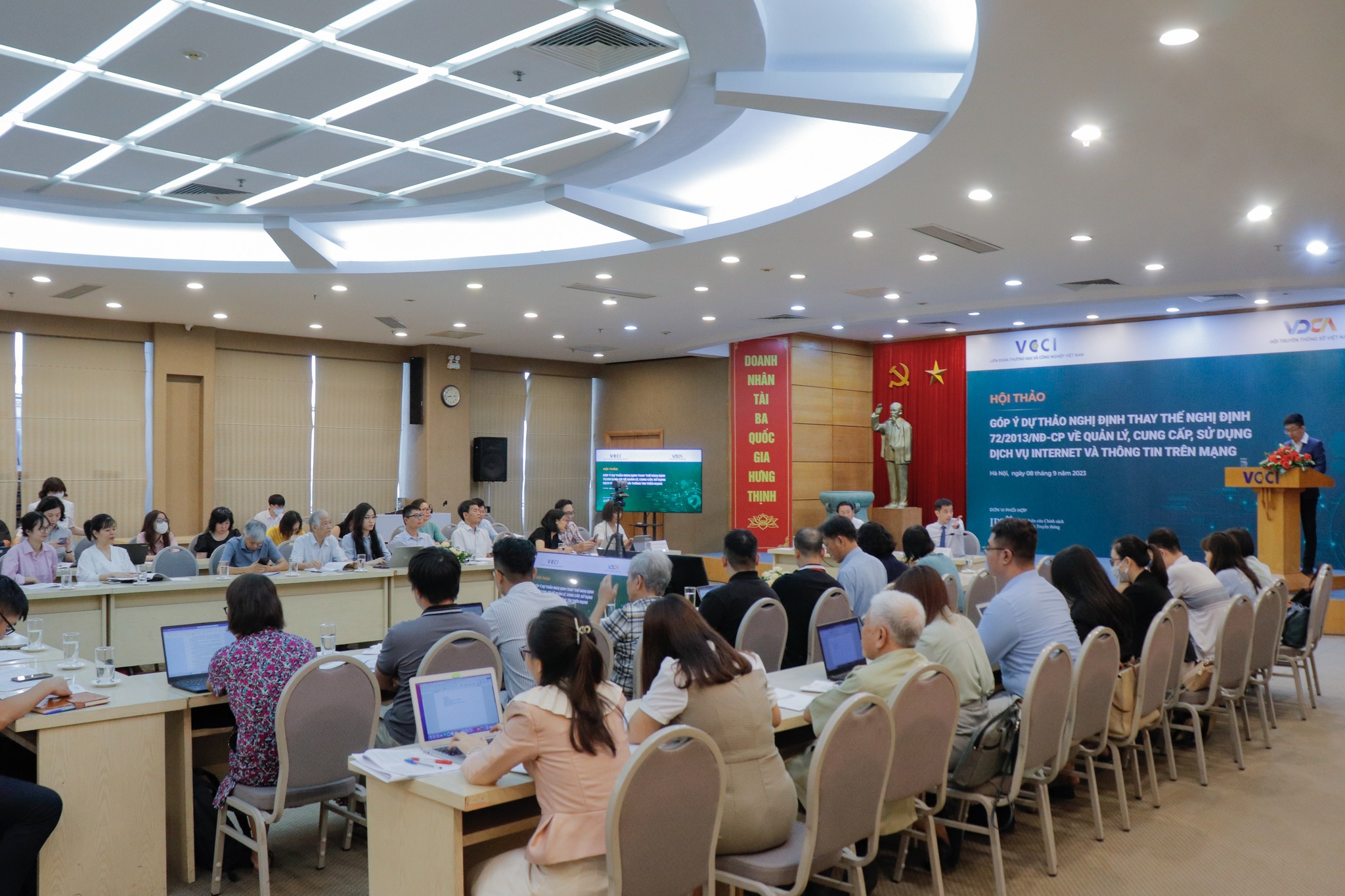
Overview of the Conference Hall
In her opening remarks, Ms. Nguyen Thi Thanh Huyen presented the key points of the Draft Decree replacing Decree 72/2013/ND-CP on management, provision, and use of Internet services and online information (hereinafter referred to as the Draft Decree) Many issues are of great concern to attendees, such as the time frame to block violated online content; regulations on blocking websites, channels, accounts, and applications; disconnecting Internet services for organizations and individuals violating the law; user account verification on social media platforms through mobile phone numbers in Vietnam; requirements for social media platforms to provide content search and scanning tools as requested by the MIC, or new regulations for application stores.
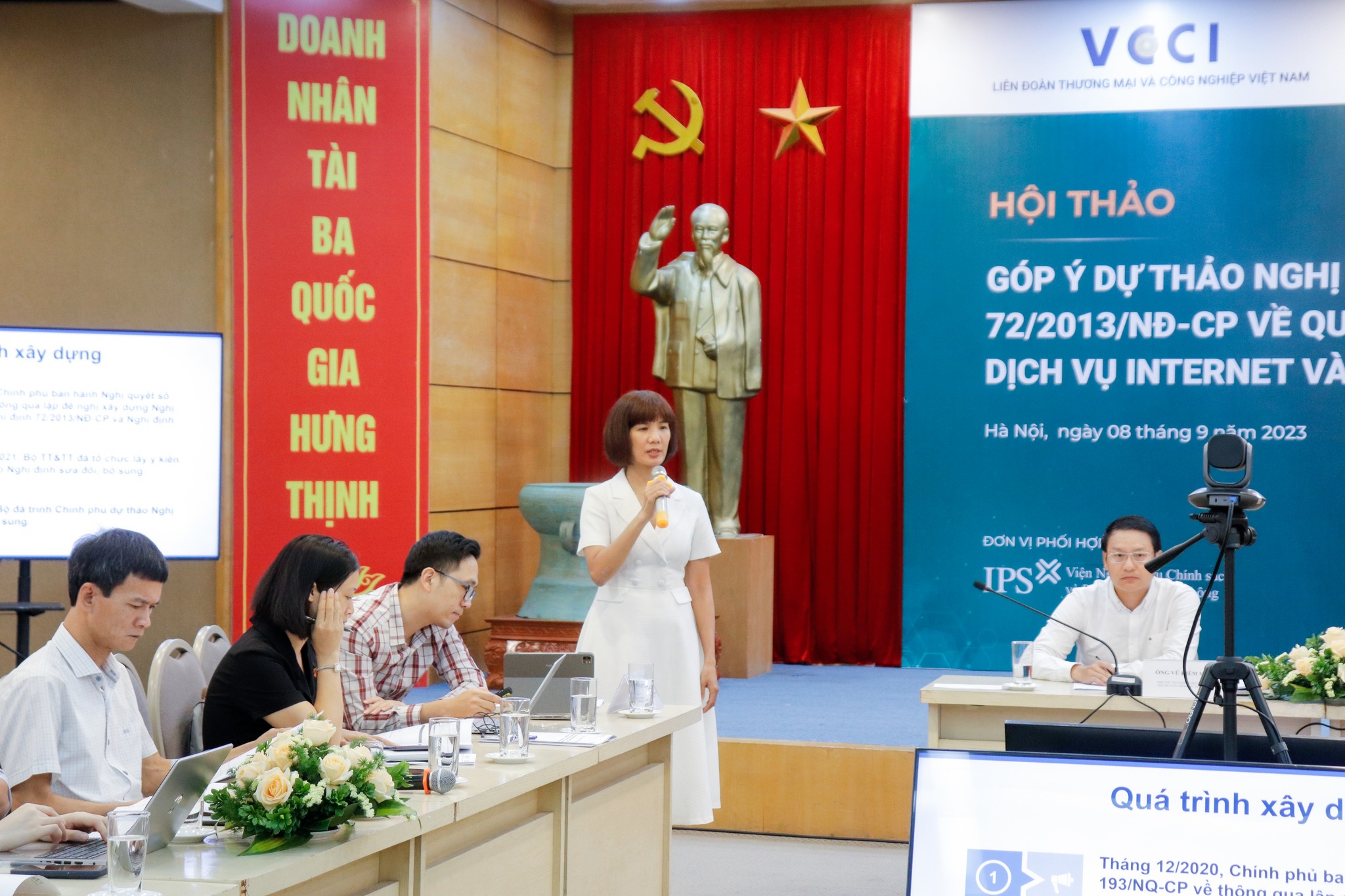
Ms. Nguyen Thi Thanh Huyen - Deputy Director of the Authority of Broadcasting and Electronic Information, Ministry of Information and Communications, presented at the Conference
Following the presentation, attendees provided comments and feedback on the Draft Decree, expressing certain concerns regarding the anticipated impacts of the regulations in the Draft on business operations and putting forward recommendations to the drafting agency – the Authority of Broadcasting and Electronic Information, MIC.
Firstly, regarding the scope of regulation: The Draft Decree is managing many different types of services on the telecommunications network, but these types of services are not clearly categorized. The Draft Decree regulates two subjects: Internet services and online information. In particular, online information includes:
- (1) cross-border information provision,
- (2) electronic information websites,
- (3) domestic social media networks,
- (4) mobile telecommunications network information provision services.
- (1) cross-border information provision,
- (2) electronic information websites,
- (3) domestic social media networks,
- (4) mobile telecommunications network information provision services.
It is worth noting that these services have fundamentally different natures, but they are grouped together in the Draft Decree as online information provision services. For example, domestic social media networks companies do not provide information but merely provide technology platforms for users to connect and share information. Similarly, companies like Google, Meta (Facebook), Youtube, TikTok, Twitter essentially act as intermediary service providers enabling users to share information with each other and should not be considered as cross-border information providers. Only companies providing electronic information websites and mobile telecommunications network information provision services are those directly providing online information to users.
Furthermore, the concept of "online information" is very broad and includes all websites of newspapers, magazines, and personal blogs. Regulating all information on the Internet in the Draft Decree is not appropriate.
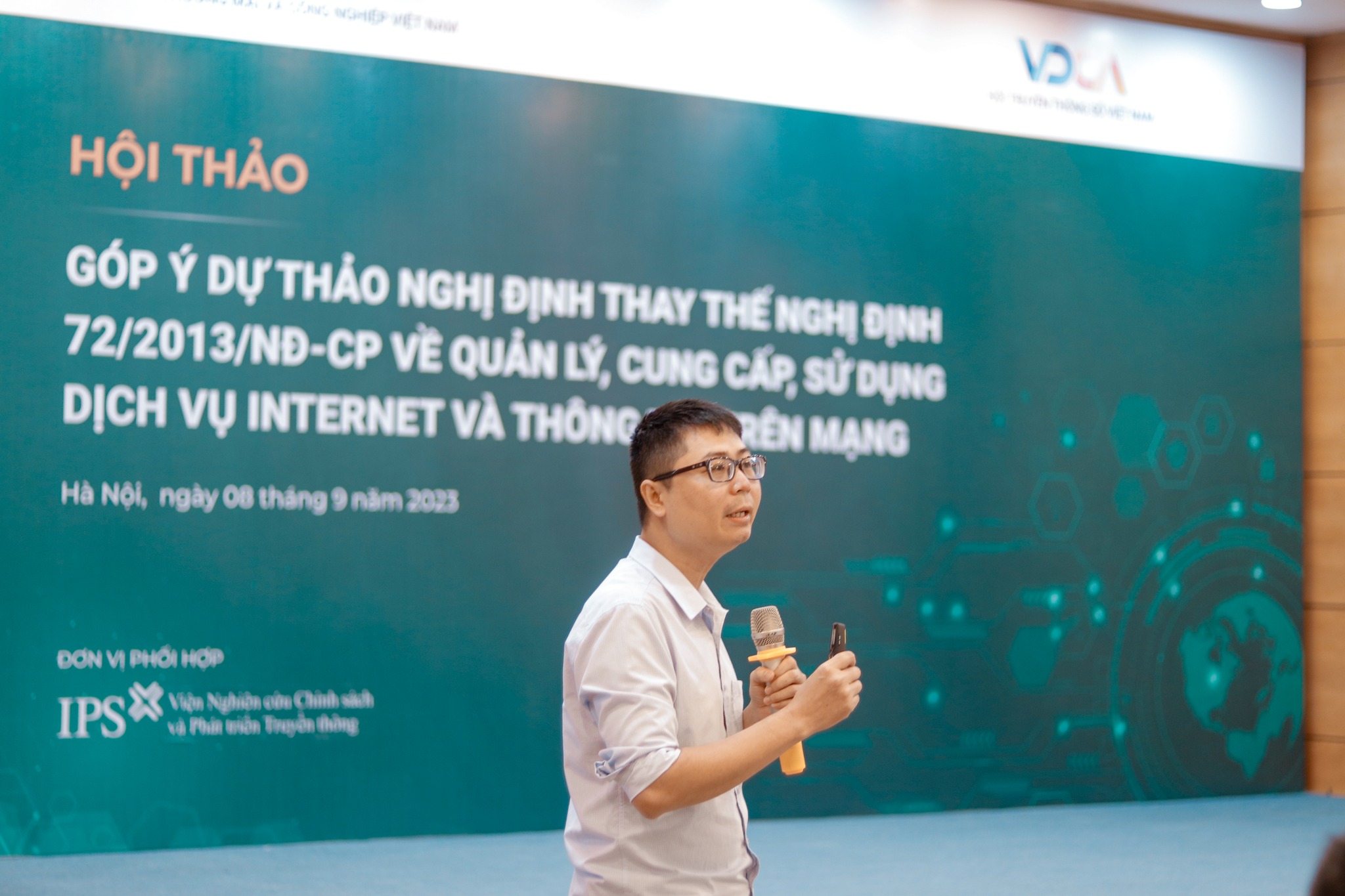
Mr. Nguyen Quang Dong, Director of the Institute for Policy Studies and Media Development, said that the scope of regulation of the Draft Decree is too broad
Thus, attendees recommended that the drafting agency review the scope of regulation of the Draft Decree and clearly classify the services it regulates. Services should be divided into Internet services, domain name registration and maintenance services, information provision services (electronic information websites, mobile telecommunications network information provision services), and intermediary services (social media networks, search engines, video sharing, app stores). Additionally, it is advisable to use a consistent legal term, "intermediary services," for the type of services that act as intermediaries, such as social media networks, search engines, and video sharing platforms, which are often referred to by various names like digital platforms and cross-border digital platforms."
Secondly, the Draft Decree is expected to increase compliance costs and affect the business models of telecommunications enterprises and data storage service providers. According to the Draft Decree, these types of businesses are required to monitor and supervise user information on their technical infrastructure to remove unlawful content.
To comply, businesses will have to invest more resources in personnel, finances, and organizational processes. However, compliance remains difficult because these businesses do not have the legal authority to determine which information violates the law. Meanwhile, in essence, telecommunications enterprises and data storage service providers are intermediary service providers that facilitate the storage and transmission of user-generated data, so they should not interfere with or be held responsible for user content. Furthermore, monitoring user information puts these businesses at legal risk of infringing on user privacy, as stipulated in the Consumer Protection Law and Decree No. 13/2023/ND-CP on personal data protection. The provision on monitoring user information in this Draft Decree contradicts the provision in the draft Law on Telecommunications amendment (expected to be passed by the National Assembly in November 2023), which states that data storage service providers do not need to monitor users.
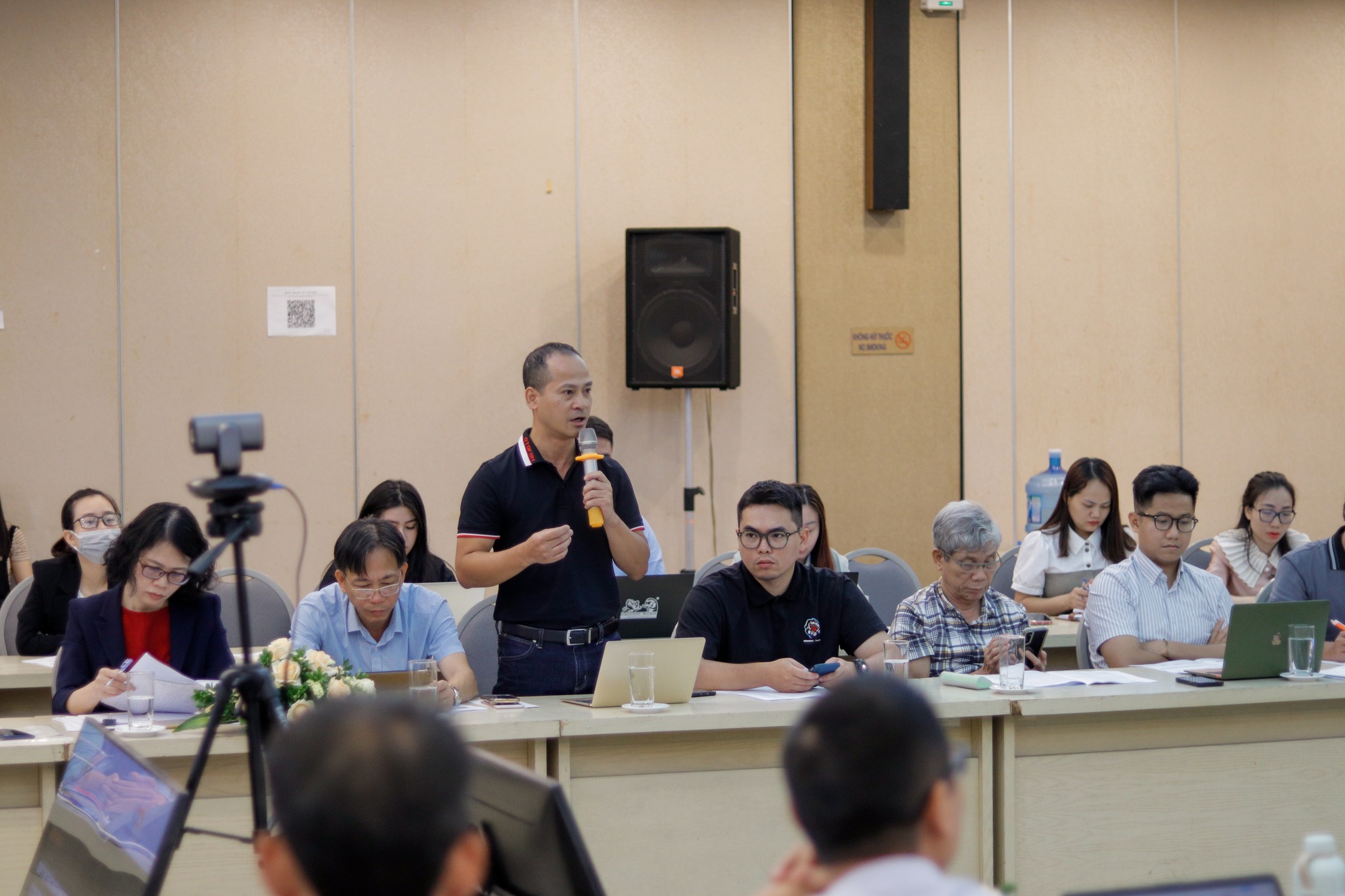
Mr. Pham Thanh Le, Administrator of Otofun Forum, believes that requiring social networks to monitor content posted by users is unreasonable.
Therefore, businesses propose that the drafting agency eliminate the provision on the general obligation to monitor user information for telecommunications enterprises, data storage service providers, social media businesses, and cross-border information providers as well.
Thirdly, the Draft Decree is anticipated to lead to increased compliance costs for businesses in removing content that violates the law upon the request of the Ministry of Information and Communications within 24 hours of receiving the request. The Draft Decree does not specify the process for removing content upon the request of the competent state agency, and the requirement to remove all violated content within 24 hours, regardless of the severity of the violation, is deemed unfeasible.
Fourthly, the Draft Decree is expected to increase market entry costs for businesses providing services through mobile applications (apps) on smart devices. According to the Draft Decree, businesses are only allowed to upload apps to the app stores if they hold permits, certificates, and confirmations as stipulated by the Decree. This introduces additional administrative procedures for all businesses wanting to provide services or products through apps while the purpose and effectiveness of this regulation are not clear.
Fifthly, the provision on user account verification on social media networks using phone numbers may increase the risk of personal information leakage for users and legal risks for businesses. Currently, each individual's phone number is not only a mean of communication but also linked to various other personal information such as names or bank accounts. In addition, user identity verification through phone numbers conflicts with the data subject's right to agree or disagree with the processing of their personal data, as specified in Decree No. 13/2023/ND-CP on personal data protection. Delegates also question whether this requirement would exacerbate the unresolved issue of unregistered SIM cards sale.
Lastly, the Draft Decree continues to create barriers for businesses in the online gaming service sector. Currently, many businesses face difficulties related to administrative procedures when releasing games under Decree No. 72/2013/ND-CP and Decree No. 27/2018/ND-CP, and these administrative procedures are maintained in the Draft Decree. In the spirit of Decision No. 1994/QD-TTg/2021 on reducing and simplifying regulations related to business activities, online gaming service providers hope that the drafting agency will eliminate administrative procedures related to the issuance, amendment, supplementation, reissuance, and extension of licenses for G1 online gaming services and the issuance, amendment, supplementation, reissuance, and extension of certificates for G2, G3, G4 online gaming services. In addition, more consideration is necessary for regulations on the location of public internet service provision and the age of online games players to create more favorable conditions for the development of e-sports in Vietnam.
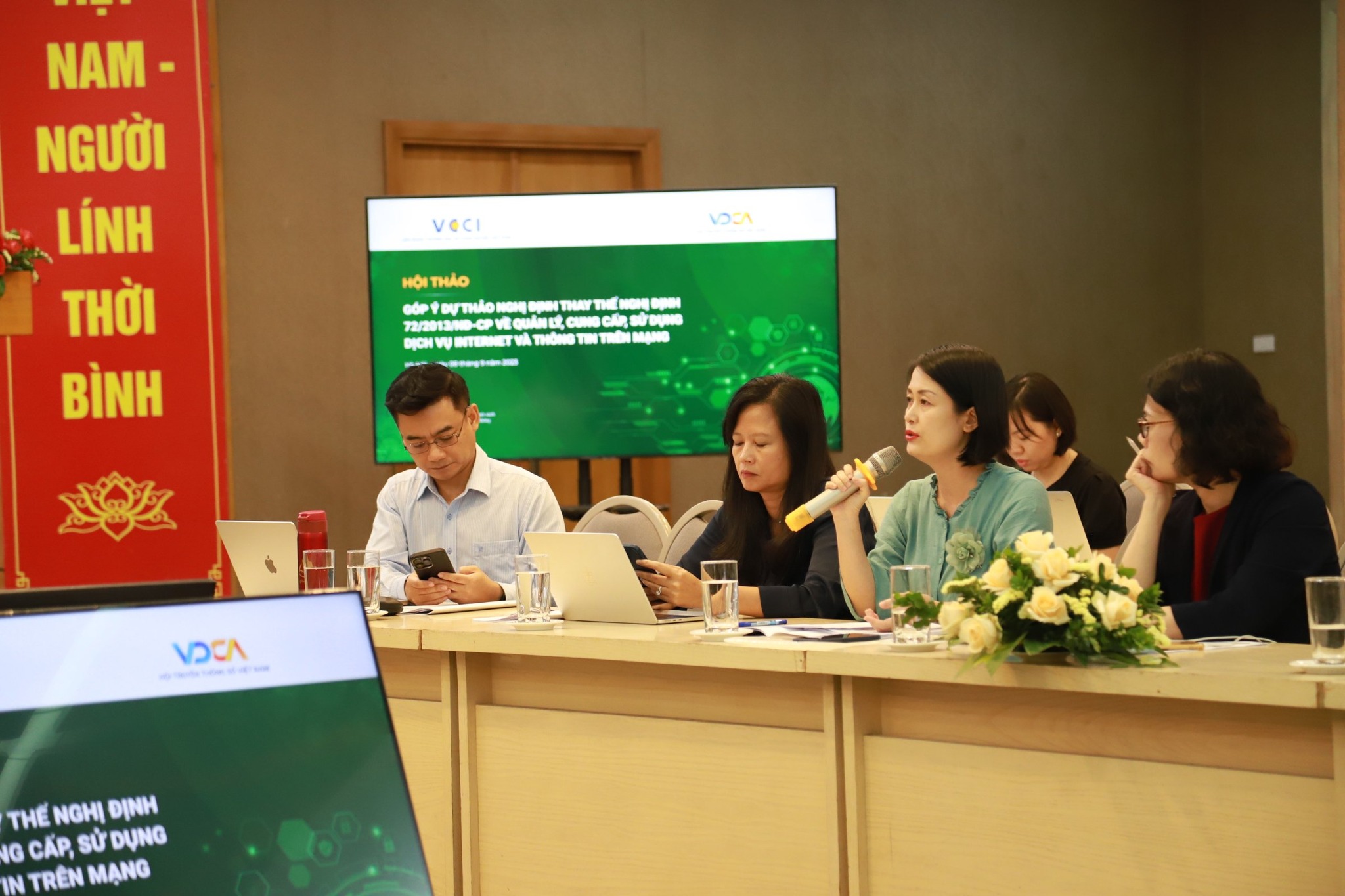
Ms. Luu Huong Ly (Department of Civil - Economic Law, Ministry of Justice) said that regulations on legal copyright certificates for video games are not consistent with the Intellectual Property Law and create additional administrative burdens for businesses
All comments provided by attendees will be compiled by VCCI and VDCA and sent to the drafting agency of the Draft Decree for consideration and further refinement before it is submitted to the Government in October 2023.


.png)

